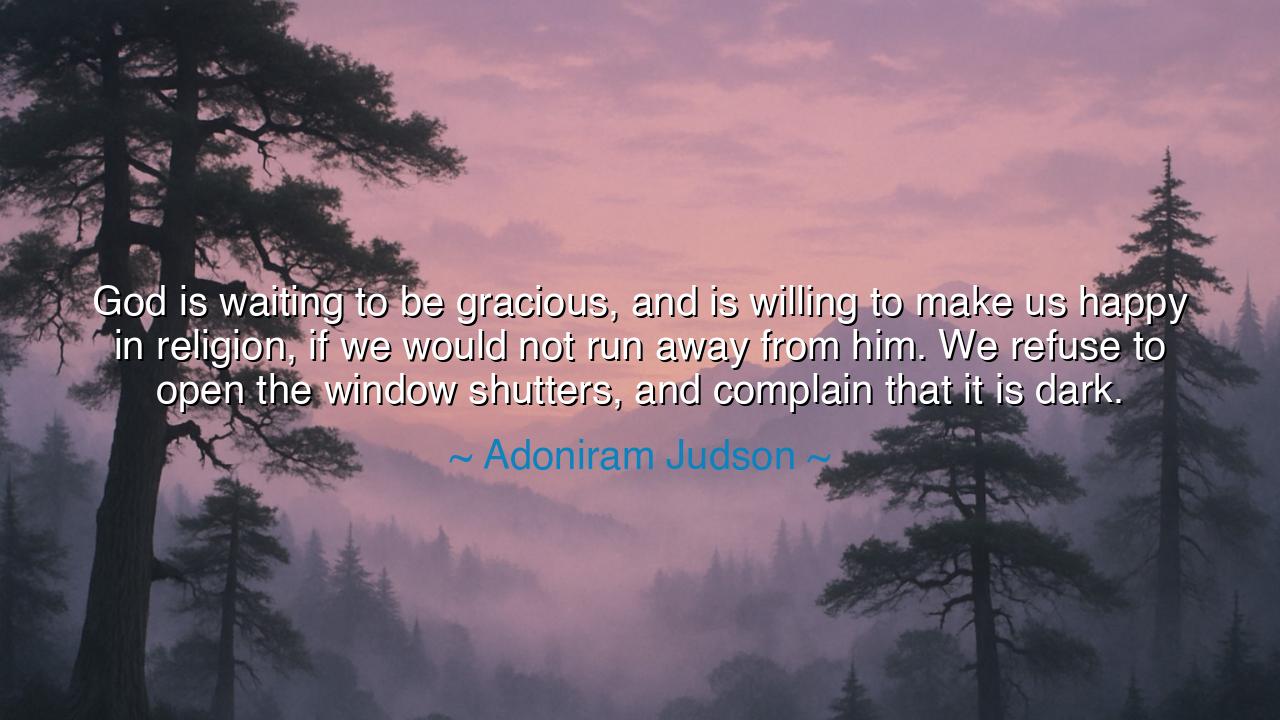
God is waiting to be gracious, and is willing to make us happy in
God is waiting to be gracious, and is willing to make us happy in religion, if we would not run away from him. We refuse to open the window shutters, and complain that it is dark.






When Adoniram Judson, the missionary and man of unshakable faith, declared, “God is waiting to be gracious, and is willing to make us happy in religion, if we would not run away from him. We refuse to open the window shutters, and complain that it is dark,” he spoke from the heart of experience — from the depths of human struggle and divine revelation. His words are a cry and a comfort both: a cry against the blindness of the human heart, and a comfort in the boundless patience of God. For in this sentence, Judson unveils a timeless truth — that the light of grace is ever shining, yet man himself often hides from it, choosing the shadows of doubt and pride over the brilliance of divine love.
The origin of this quote lies in the life of Adoniram Judson (1788–1850), one of the first American missionaries to Burma, whose faith was tested through unimaginable hardship. He endured imprisonment, sickness, and the death of his wife and children, yet through every agony, he clung to the belief that God’s grace remained constant — that it was not God who turned away from man, but man who turned away from God. His words were not those of a preacher in comfort, but of a sufferer who had learned that even in darkness, the light of God’s mercy waits for those who will open their hearts to it.
When Judson says, “God is waiting to be gracious,” he paints the image of a Father whose arms are forever open, whose kindness does not diminish even when His children flee. Yet, mankind, in its restlessness and rebellion, runs from that grace. We “refuse to open the window shutters,” preferring to live in spiritual dimness rather than let the full light of truth flood our souls. And then, in our blindness, we “complain that it is dark.” This is the tragedy of the human spirit — that it suffers most not from what is absent, but from what it refuses to receive.
This truth can be seen throughout history, in the lives of saints and sinners alike. Consider the story of St. Augustine, who for years sought happiness in ambition, philosophy, and pleasure. He wandered through the corridors of the world seeking fulfillment, yet his heart remained empty. Only when he turned toward God did he discover that the light he sought had always been near — it was he, not God, who had closed the shutters. His famous confession, “You were within me, but I was outside,” echoes Judson’s lament. Both men discovered that peace begins not when God draws near, but when we cease to flee from Him.
Judson’s metaphor of the shutter is profoundly human. It reminds us that the darkness we fear is often self-imposed. Many hide behind cynicism, pride, or guilt, afraid to confront the light of divine goodness — because that light reveals not only God’s mercy, but also our own need for it. Yet Judson, who knew suffering as few have known it, assures us that the light does not condemn; it heals. The grace of God is not a distant reward, but a present offering — waiting patiently for us to turn the latch, to open the soul’s window, to let love enter where despair once lived.
His message is both tender and urgent. He calls us to stop running, to face the divine not with fear, but with trust. God does not withhold joy; it is we who refuse it. Religion, when lived rightly, is not a burden, but a source of happiness — the alignment of the heart with its Creator. To live apart from this light is to live half-awake, murmuring at the darkness we have chosen, while heaven itself stands ready to pour radiance into our lives.
The lesson, therefore, is clear and eternal: if your world feels dim, do not curse the darkness — open the shutters. Lift your heart to what is good, pure, and eternal. Do not flee from grace, but let it find you. The happiness of the soul is not a secret hidden from man, but a treasure waiting for him to stop running and look upward. In your doubts, your grief, your weariness — remember Judson’s wisdom: the light has not gone out; you have only to turn toward it.
So, my child, take these words as both warning and promise. God is not far off; He is waiting, patient as dawn. The shutters are in your hands — the choice to live in darkness or in light is yours. Open them, and you will find that heaven was never silent, that joy was never gone, and that the grace of God, like the morning sun, has been shining all along — waiting only for your heart to face the east.






AAdministratorAdministrator
Welcome, honored guests. Please leave a comment, we will respond soon